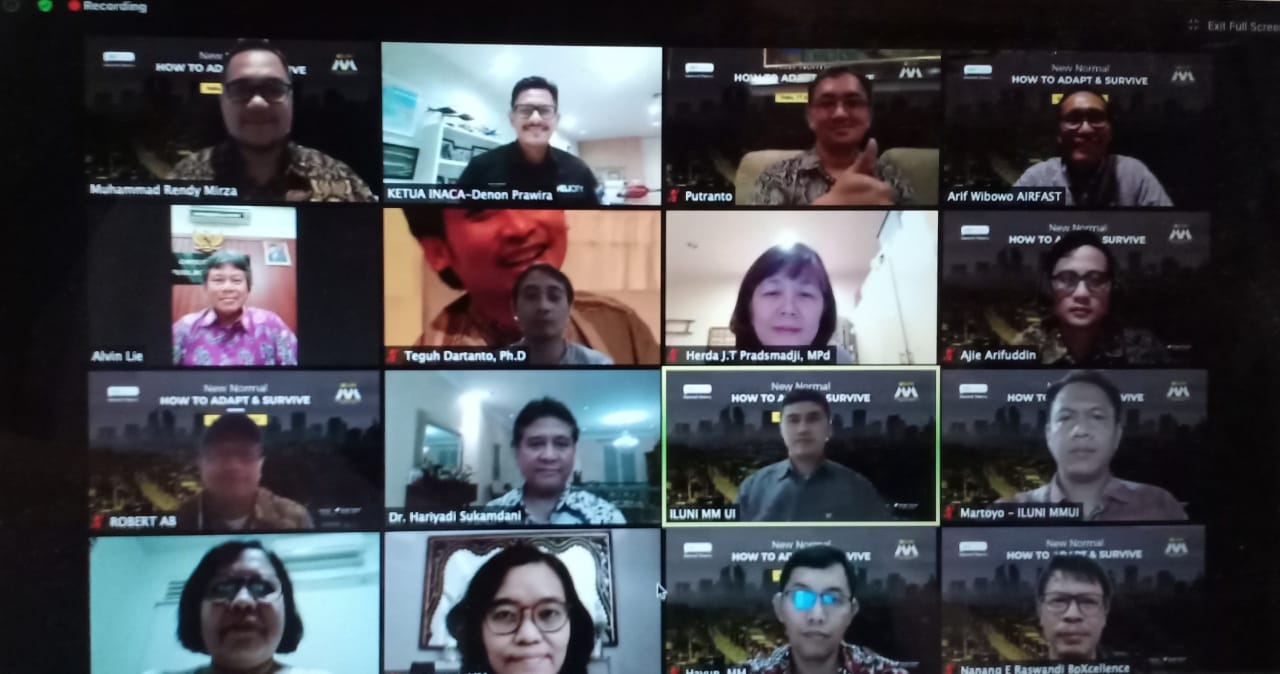ILUNI MM FEB UI’s CEO Talks Series: New Normal, How to Adapt and Survive
The Alumni Association of the Master’s Degree Program in Management, Faculty of Economics and Business, Universitas Indonesia (ILUNI MM UI) held CEO Talks series 8 taking New Normal, How to Adapt and Survive as its theme (17/06).
The virtual event was joined by FEB UI leaders, including Vice Dean 1 Teguh Dartanto, Ph.D, Herda J.T. Pradsmadji, MP.d., executive secretary of the faculty, Prof. Rofikoh Rokhim, the head of the Master’s Degree Program in Management (MM), and Yeshika Alversia, MM, secretary of the MM study program.
Speakers at the event were Dr. Ir. Hariyadi Sukamdani, MM, KADIN deputy chairman for monetary, fiscal and public policy, chairman of Apindo (Employers’ Association of Indonesia), President Director, PT. Hotel Sahid Jaya International, chairman of the Indonesia Hotel and Restaurant Association, Denon Prawiraatmadja, CEO Whitesky Group, Chairman of the Indonesia National Air Carriers Association (INACA), and Alvin Lie, a member of the Ombudsman of the Republic of Indonesia. The CEO Talks series 8 was hosted by Muhammad Rendy Mirza, SP, MM, founder and CEO of PT. Zafa Consultant Indonesia.
“Adapt and survive. Don’t panic, you are not alone in facing this situation, try to think clearly and seek input from various parties to survive. Look after your mental health, manage cash flow as long as possible, we don’t know when the pandemic will end. Always think positively, be proactive and don’t be reactive. Resolve issues you can control. Maintain team solidity within the company, involve partners, management and employees in finding solutions. Take care of personal health and the immediate environment,” Hariyadi Sukamdani.
Denon Prawiraatmadja explained the new standards of behavior (new normal protocol) from the perspective of the aviation industry. He also explained the current pre-flight, in-flight and post-flight conditions in the aviation industry.
“During pre-flight, pre-clearence on documents, such as online ticket reservations, health checks, boarding (social distancing), applies. During in-flight, physical distancing is implemented, with only 70% of seats occupied by recognizing passenger characteristics or seating arrangements, universal precaution kit (UPK), equipment, masks, disinfectants/gloves prepared by the airline. Crew attributes and procedures according to the COVID-19 protocol. During post-flights, touchless verification is implemented with transit passengers required to get off the plane, have their body temperature and oxygen saturation checked, interviews as well as document verification, fast baggage collection and passenger handling,” said Denon
Alvin Lie, a member of the Indonesian Ombudsman, explained the challenge of surviving and growing amid the threat of Covid-19.
“It is important to increase awareness of hygiene and health with the development of a healthy lifestyle, changes in the health service system, development of telemedicine and challenges for health and mental insurance,” said Alvin.
“Work that does not require discretion, creativity and physical contact will be performed by machines or information technology. Humans will focus on creativity or innovation, communication skills, decision making, controlling and utilizing technology, although some works will still be more efficient when done by humans or the results will be more fun if done by humans,” he added.
“In the future, there will be changes in social intimacy. The strengthening of social media will shift the role of mainstream media, neighbors become closer than colleagues, nuclear family interactions will be more intense,” Alvin concluded.
(lem)



